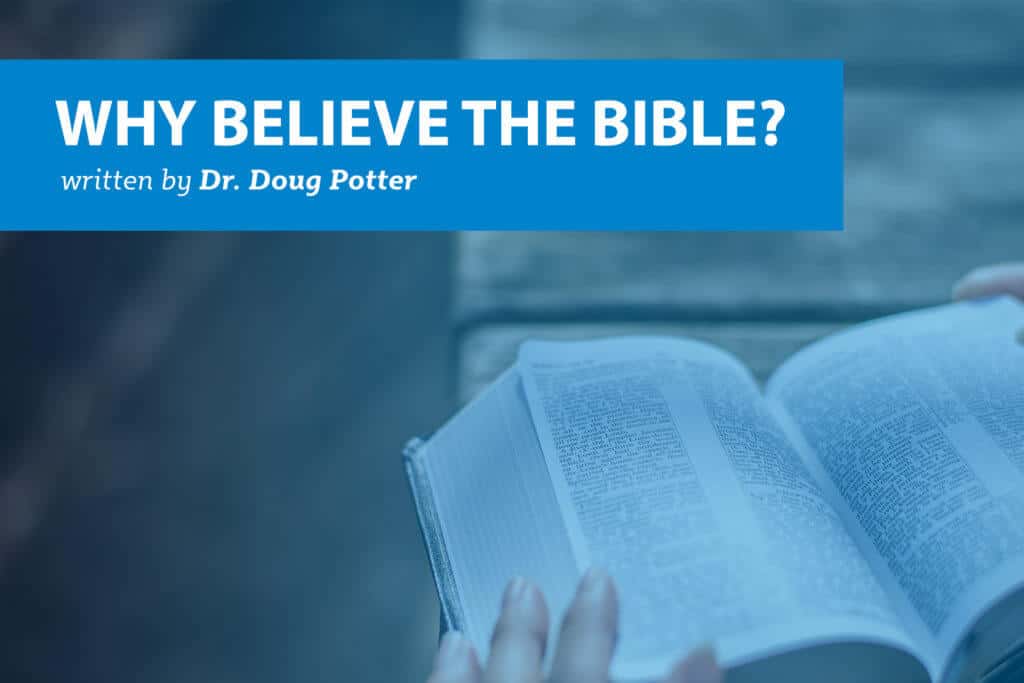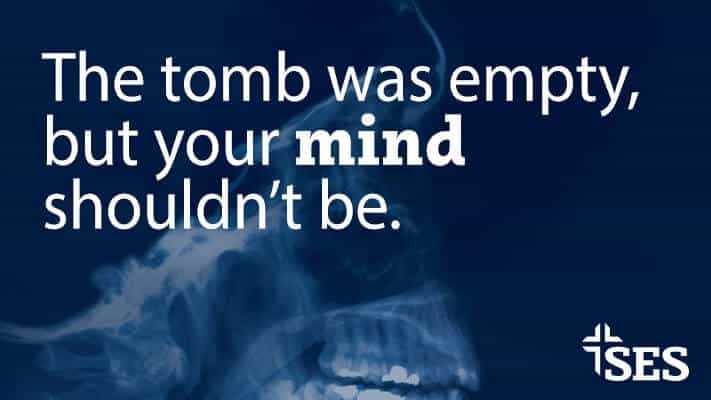As we enter another Christmas season and hear the Bible referenced and quoted in pop culture more than perhaps any other time of the year, the question is sure to arise as to why one should trust the Bible. An article on a popular Christian website attempted to answer that very question. More specifically, the question is, “What is the authority upon which you believe the Bible to be true?” The problem with the article’s answer is that it only cited remarkable facts about the Bible as the authority upon which one should believe the Bible. It says the Bible is unique, gives one consistent story of redemption, is accurate, even prophetic, claims a divine origin, and changes lives. All good and well, but more is needed to complete the picture of the authority upon which we should believe the Bible is true.
This is especially needed because, as the article acknowledges, we live in a confused world, at times a confused church, and I would add at times have a confused Christian apologetic. Particularly one that is incomplete, at times circular in reasoning, and often missing the goal of apologetics, that is giving answers that demonstrate the truth of Christianity. Therefore, I offer a more comprehensive answer.
The truth about the world is knowable.
It is undeniable to state that “truth about the world is knowable.” This is because if one wanted to affirm the opposite, “truth about the world is not knowable,” they would have to at least affirm that statement itself which is a knowable truth about the world. The truth about the world is inescapable and objective. Granted we may say our knowledge about something is limited, approximating, subject to correction, and so on. But we cannot say it is all relative, subjective, and unknowable. As affirming these would be self-defeating. We know the world is as it is because we cannot make or control what the world is. We are passive with respect to what is given us by the world, we take it in through our senses and intellect, develop concepts, make judgments and reason about it. So, we are on safe grounds affirming as one former enemy of Christianity said, that people knowing creation (that is, the world) should conclude that only one eternal and invisible God exists (Romans 1:20-21).
God exists, so Theism is true.
People can come to believe God exists in many ways. They may accept it on faith or upon the authority of another, such as when a child believes God is real because their parents or teacher says so. Or they may conclude simply based on the existing world that they believe God created it. Or others, yet still, may want or need a formally reasoned argument to demonstrate the existence of God. None of these are mutually exclusive. Regardless of how one gets there, God exists.
This means we should not think of God as a creature in the world. Unlike creatures, God is not composed of matter or parts. He does not change. He did not come to be and cannot cease to be. He is spiritually simple, eternal, immutable. In short, God is pure existence, and must therefore give and continually cause everything else to exist. All this is knowable and discoverable apart from the Bible.
The True God is the God of the Bible.
Remarkably, when we open the pages of the Bible, we find the very same God with the same divine nature as discovered apart from the Bible. God is pure existence (Exodus 3:14), Eternal (Psalm 90:2), and Immutable (Malachi 3:6). There can only be one God, one such being that is pure existence, eternal and immutable. If there were two, they would have to differ in some way. But since God is not a creature, He has no matter, no parts and therefore no categories by which we could describe any differences. We could only say God #1 is eternal and God #2 is not eternal. But to be not eternal is to be finite or a creature, God #2 is no God at all. Remember God is not like anything in the world, that can differ by size or shape since He has none (John 4:24). To think there could be multiple gods is to put Him in the category of a creature.
So, if there cannot be two eternal beings, then the God concluded from reason and the reading of the Bible must be one and the same. The Bible may indeed tell us more about God and His plan for us and the world, but there is only one divine nature (Deuteronomy 6:4).
The Bible claims to be the Word of God and proves it.
The Bible consistently claims to be the word of the one and only true God (Genesis 1:1; Revelation 22:20-21). From beginning to end, prophets appear in its pages claiming to speak the word of God. They not only make this claim, but they offer multiple miracles to their listeners and multiple prophecies to their readers to back up what they are saying is from God. The miracles they do are clearly in the category of what only God can do. They create life from non-life (Exodus 8:19) and raise the dead (1 Kings 17:17-24). They include predictions hundreds of years in advance (Daniel 9:25-27). Such signs are unmistakable from the true God. Such miracles and prophecies are used to back up the spoken and written word from the prophets (see Moses and Joshua, Elijah and Elisha, Jesus and Paul). The true God would never allow real miracle or prophecy to be done through a false teacher or false religion. So, the religion that contains true miracles is the true religion. This is what separates Christianity from other religions and their books.
The Bible is historically accurate about Jesus’s life, death and resurrection.
We know the Bible is historically accurate because it was faithfully copied from the originals and the content, what it says occurred, happened much of which can be verified. The number of hand-written manuscripts is more than enough to establish a text that is faithful to the originals. These manuscripts show a direct line very close to the time the originals were written and the vast numbers (over 5,000) allows experts to compare them and come to the most reliable reading. It is a true saying, that if we are to doubt the text of the Bible, we must throw out all the works of antiquity as well.
Unlike other religious books, the Bible provides a strong link between its history and truth claims. This includes historical details such as dates, places, and people in that period (see especially the Gospels and Acts) not easily fabricated. It reveals embarrassing episodes which show authenticity since they are unlikely to be made up (see Peters’ denial of Jesus). It provides descriptions and explanations of historical events acknowledged by former enemies writing independently (see Paul’s letters that affirm many events recorded in the Gospels) and non-biblical writers (that support the basic outline of Christianity). The Bible provides historical facts such as the claim of Jesus to be God, his death on a cross, an empty tomb, the changed lives of the disciples who testified under the threat of death that they saw, spoke and ate with the bodily risen Jesus. All this can only adequately be explained by the greatest miracle of all: God raised Jesus of Nazareth from the dead.
The Bible is true because the Son of God teaches that (John 17:17).
I believe the Bible is authoritative because: 1) The God of the Bible exists. 2) Miracles and prophecy offer an unmistakable sign of a true message from God. 3) The Bible is historically accurate concerning the life, death, and resurrection of Jesus. And finally, 4) Jesus who is God in the flesh taught that the prophets spoke and wrote God’s word (Luke 24:44) and promised this same prophetic ministry for his immediate disciples and prophets (John 14:16-17). Hence, the Bible alone, as acknowledged by a former persecutor of believers, is the only authoritative written record inspired by God (2 Timothy 3:16).
In short, I believe the Bible because people can reason to God and about Jesus being the risen Savior. The Bible has the authority of the true God, as taught by His one and only Son, and therefore cannot be broken (John 10:35).
So, this Christmas, as we celebrate the truth of God with Us, Emmanuel, let us remember that our hope and salvation which began with the birth of Jesus, and culminating in His resurrection, is a confident hope and sure salvation. It is revealed in the true and inerrant written Word of God and grounded in the love and grace of the Unchangeable God.







